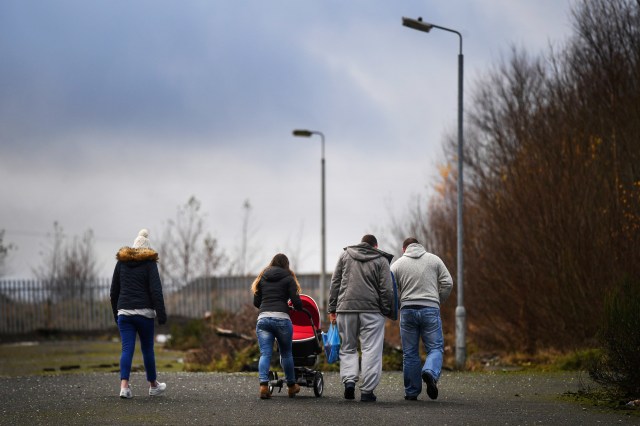Glasgow. Credit: Jeff J Mitchell/Getty Images

There’s no better time than the summer holiday, when you’re distanced from the constant drip-feed of 24-hour news, to absorb a wider perspective on how the UK got to where it is now.
On the historical front, David Edgerton’s The Rise And Fall Of The British Nation: A Twentieth Century History offers an interesting analysis of Britain’s behaviour as a nation in the Fifties, Sixties and Seventies, a period that took in the end of Empire and the early days of our entry into Europe. The book argues that Britain in this period had a distinct economic, cultural and political coherence that it lacked before – and also since, as service industries replaced manufacturing and London became a host for international capital.
Edgerton’s long view provides valuable context for the polarisation of British society which became most sharply evident in the EU referendum vote of 2016 and its aftermath: while that vote may have been a symptom of a divided nation, the underlying causes were taking shape decades earlier.
Darren McGarvey’s Poverty Safari: Understanding The Anger of Britain’s Underclass – an Orwell Prize winner – gives highly readable, eloquent voice to the communities that were left behind: the author and rapper, who grew up with an alcoholic mother in Pollok, Glasgow, describes how the manifold stresses of poverty play out in casual violence, illness and addiction.
McGarvey’s critique falls on both an inactive, ideologically-obsessed Left and a censorious, lecturing Right. As well as providing fresh, biting insights from a group that middle-class society frequently prefers to talk about rather than talk to, he sets forth a new vision of personal responsibility: one that energises working-class people and communities to take a role in changing their own future for the better.
This summer I am also reading Ctrl Alt Delete by the journalist and former Labour party adviser Tom Baldwin, which looks at how the media and politics wrestled each other for control of stories, the rise of desk-based journalism, and the gradual death of local newspapers and corresponding political accountability. At times reading like an insider’s mea culpa, the author anatomises how news coverage became more patchy as many specialist reporters and foreign correspondents got the axe, and difficult but important stories were routinely downgraded in favour of internet clickbait.
Sliding editorial standards in the media, even in the pre-digital age (Baldwin recalls newspaper colleagues describing misleading stories as ‘a bit of fun’ or ‘causing mischief’) combined with the speeding-up of the story cycle to ease the rise of rumour and false news. Attention-seeking trumped accuracy. This, he argues, has had a knock-on effect on the volatility of political life, blurring the line between facts, opinions and feelings, and permitting politicians to detect and fan existing prejudices in a febrile ‘post-truth’ landscape. It’s an absorbing read, even for those of us who would also ascribe our increasingly liquid politics to more tangible factors outside the media, including the housing crisis and the growing precariousness experienced by those in the low-wage economy.
Sometimes, however, holiday reading demands an escape into another place and time entirely: for that, I can recommend Aida Edemariam’s The Wife’s Tale, her fascinating account of her Ethiopian grandmother Yetemegnu’s drama-filled life, starting from her birth in 1916 in the northern city of Gondar: there followed marriage at eight-years old to a priest two decades her senior, nine children, and life under both Fascist invasion and Emperor Haile Selassie. Along with the great sweep of the story, with its rhythms of ritual and religion, what captured me is the sensuousness in the author’s description: the kernel of frankincense thrown on the fire, the smell of prized coffee, the rising scent of the earth after rain.
Elizabeth Day’s The Party – a literary page-turner in which the plotting keeps pace with the writing – is another worthwhile read, now out in paperback. It is a psychological drama set in 2015, during the ‘chumocracy’ of the Cameron years. A married art critic, Martin, has long negotiated life in the shadow of his absurdly wealthy, aristocratic friend Ben (a pal of the Prime Minister): the tensions between the two men come to a head at Ben’s lavish 40th birthday party. The relationship between Martin and Ben permits a wickedly accurate dissection of the pain and potential payback of an unequal friendship in a way that reminded me of Zoe Heller’s wonderfully disturbing Notes on a Scandal.
I have also begun reading – and can already recommend – Anthony Quinn’s Our Friends In Berlin, a cat-and-mouse game of espionage set in wartime London in which the dialogue and atmosphere are perfectly pitched: very few writers can bring the past to such vivid life. As I read of the bombs falling on London in 1941, amid stakes that could not have been higher, it puts even our long, hot summer of political turbulence into some perspective.










Join the discussion
Join like minded readers that support our journalism by becoming a paid subscriber
To join the discussion in the comments, become a paid subscriber.
Join like minded readers that support our journalism, read unlimited articles and enjoy other subscriber-only benefits.
Subscribe